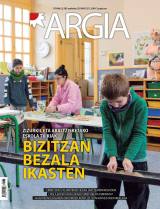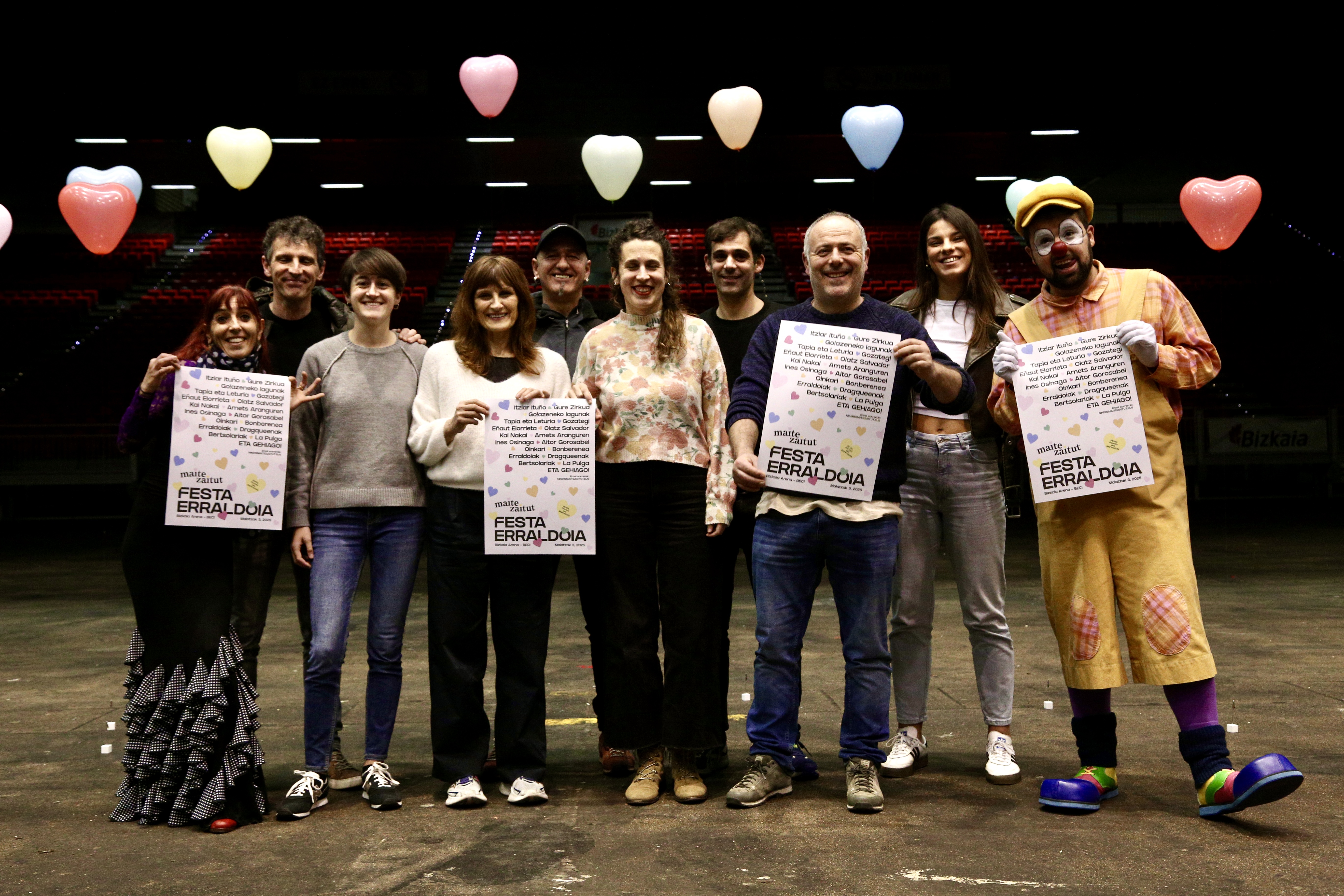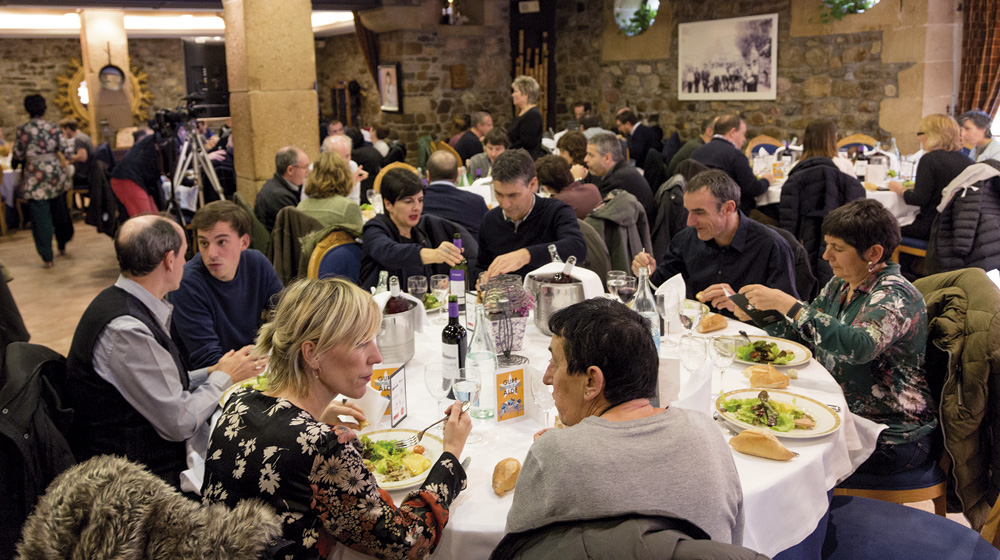"Clown has helped me take another attitude to defeat."
- The name of Beatriz Egizabal has become popular lately, since the Erradikalak gara show, and many people have wondered: “Where did this come from?” Egizabal, who has been telling stories for 20 years, has been working as a professional narrator and clown since 2005. In this interview, rather than where it came from, we've tried to figure out what it's been doing.

Narratzailea eta pailazoa. 1998an ekin zion ipuinak kontatzeari, eta 2005az geroztik buru-belarri dihardu oholtza gainean, clown eta kontalari, besteak beste, Kontukantoi taldean, Cesar Marcos kidearekin. Feminismoa dute lanean ardatz, ipuinetako estereotipoak irauliz eta iruditegi berriak sortuz. 2017ko otsailean Erradikalak gara ikuskizuna estreinatu zuten Ane Labaka bertsolariak eta Egizabalek, bertsoa eta bakarrizketa uztartuz. 36 plazatan erakutsi dute urtebete eskasean.
You're a storyteller and a clown, but you have nothing to do with the performing arts from the point of view of learning. What do you owe to your passion?
I've always been a charlatan, I've always liked to do it. I remember Caesar and I, as a young man, spent hours and hours talking at the Ilargi Tavern. It was an awkward place, but we would stay there without getting tired: we would always say that if we were forced to be there we would make a complaint to those who forced us, because it was a terrible cold. But I remember once, when we were both there, he drew, because Caesar drew anywhere, with our boy crisis, and I remember saying, “Think we will be paid to speak,” he said, “and to make drawings.” At that time it seemed like a dream, to think, to speak and to draw, and now ...
That is now the case. You started telling stories earlier than in Clown. How?
In my studies, I studied another way, studied the environmental health module at Arrasate, and then I started working there myself, at Lagun Aro [Seguros], taking care of occupational health and hygiene. So, Oihulari organized a storytelling course in Antzuola. I knew Oihulari's [Imaz] Rakel and I cheered on. I did the course, and soon afterwards Rakel called me, who needed someone in Irun's library to tell the stories, and to see if I was going. I'm a bit like this, I'm not going to say I want to tell stories, but if you've asked me for it, because it's your responsibility, you know who sends it to you... and I left. I was very comfortable, I started going more, and in the end I spent almost every Wednesday telling stories at Irun's library.
Is it then that he decides to devote himself to it?
No, no. I was working in a lab and it was a good job: I hadn't been hired on a fixed contract yet, but I was on my way to doing it; in fact, I got the job anybody wanted, and at that time it wasn't easy to find anything that had to do with what you learned. But, well, I knew they could offer me a fixed contract at any time, and that caused me chills.
I guess everyone would want such a job, but you wouldn’t…
I don't. Because it was largely in Mondragon, and I still didn't have a broken umbilical cord, I had a very strong bond with Lasarte. It was a lot of stuff, and in the end I quit the job. I already told stories at intervals, but I couldn't live from it. On the other hand, to get dressed as a storyteller, I began to study magisterium and dedicated myself to other works, until Oihulari intervened again with another course.
And you met the clown.
That's it. Two- or three-day courses were organized in Brinkola. Caesar and I went and flipped. All the experience, the course, the pedagogy of Oihulari… we liked a lot. And then we just happen to run courses, and Virginia [Imaz] was with Cirque du Soleil in the United States. United States And I wanted to renovate Oihulari back. As we were there at that time, he proposed to be part of the group. It was a university, not only in terms of training, but also in terms of work. It often happens with the clown that you can do all the courses you want, but where do you practice that? The fact of being a scream brought us a lot of scenarios.
In the past, clown did not attract anything. What finally hit you?
In these brinkola courses it was all very interesting, but I was caught with the clownclusions: listening to that adrenaline, going to a site, a conference or a course, and then going onstage at the end of your clown and telling what has happened from another point of view... I fell in love with that and I'm still in love with it.

Do you especially remember any clownclusion attempts?
I remember one because it was a click. We were sent to Seville, Anduriña Zurutuza and I, because Anduriña has also been in Oihulari and very friend, and we were sent to a congress organized by the Andalusian Women's Institute. They gathered around 500 people, and for me they were two clicks: feminism and clownclusions. In Oihulari, next to Virginia, we worked a lot on feminism; the truth is, when I was young, I was in a feminist group, but it was more of a kind of therapy, and with Virginia, that passion ignited me a lot more.
And what did you know at that congress?
For me, that congress was a very powerful feminist clik because they talked about the importance of gender mainstreaming and gender impact. Let me give you an example. Suppose that in a hospital you have to make cuts and you think you can shorten the stay for patients who have had heart surgery: it will take twenty days to do so. The cut will benefit the hospital, but congressional speakers said that there was a need to measure the gender impact. If a heart man has had surgery, he takes him home ten days earlier, and who will take care of him? For what the women in their environment, and thus the administration, saves, is left to a woman. In the case that the patient is a woman, she will not be allowed to recover it correctly, as she will be responsible for the relatives. Examples of this kind are now well known, but at that time…
When was Congress?
Year 2001. The congress lasted two days, and then we left Andurian and I to do something to all those people with our clown noses. It was terrible. I've forgotten a lot of things, but for example, most of the participants in the congress were women, about 450 women and 50 men, but nonetheless, women had one bathroom and men had another. Then a large row was formed in the bathrooms of women and men, once again, they were comfortably comfortable in their private bathroom. With this example, we explain the issue of equality and equity in clownclusions. Men and women had the same situation, a bathroom, but the starting situation was not the same, so equity would be reorganizing that of the commons. With such an imbecile example we appeared explaining two clowns why it is not fair to give the same to both when the situation is not the same. The aim of the clowns is to achieve them.
I saw you three years ago doing clownclusions in a summer course that worked the feminist view of the Basque politico-armed conflict, and I thought that a kind of catharsis had occurred, that after talking about these issues we were a little tight and that we suddenly freed ourselves thanks to the clownclusions.
For starters, there's one very powerful thing in clownclusions: improvisation. I am there while the event lasts, and all of us who are in this context are living some references, and I too am part of it, for example, if one of the rapporteurs is very heavy. My task is to be attentive and to point things out, it may be that the heaviness of a speaker or that the toilets are enormously small and that you have to lift a leg to be able to close the door. My task is not to understand everything that has been said at the event and then summarize it. I go out and start playing with what's happened, to improvise, to put a red nose, and we go to another record, to emotions. I think that may be the catharsis that you mentioned. Then, to value clownclusions would be, on the one hand, to rip off the emotions, the smile or the tear of the public, and on the other hand, to catch a phrase related to the subject, which can be used as a conclusion.
You're teaching Clown courses at Donostia Women's House. Do we all have our clown inside?
I believe that, as always, there are two areas: the public and the private. Can the writer be anyone? Yes, you can write whoever you want. But to publish it, everything is not worth it. I think something similar happens with storytellers and clowns.
I always say I've started giving courses, but I'm not a trainer. I'm teaching clown courses at the Women's House for a defined audience. If someone wants to do a clown professionally, I wouldn't tell them to go to my courses, because there are other trainers that are much more suited to training on stage. But to see if anybody can play, to see what it's like to suddenly put a red nose and appear in public from somewhere else, or if it's otherwise, of course.
What are the tools that clown offers in our daily lives for? I have heard him say that this is a way of reconciling with failure.
What happens when you suddenly put on a little mask, in this case your nose? When I started doing the clown in that course of Brinkola, I discovered it, the relationship with defeat… When something fell to me, for example, it wasn’t that I did it wrong, but that failure laughed at the public, but they didn’t laugh at me because I failed, the truth is that suddenly there was a kind of pact, and then, in part, failure was success. Now I can explain it in words, but at the moment it was not so obvious.
I, in my daily life, am not perfect, for example, if I wanted to bring to the kitchen all the cups, rags and things we have here on the table, I started by taking them at once and would complicate something so simple in itself; then, if I didn't know the clown, it would be a frustrating to want to transport it all at once and not be able to do it, and now I'm laughed.

Is it a way to learn to laugh at oneself?
Yes, and I also know that if instead of doing this at home I would have done it in a theater play, it would be great. Clown has given me another view of these kinds of conflicts, also in my personal life.
So it's not about trying to fail all the time, but when it happens, knowing that it's not that much.
That is, it is not to go in search of defeat, it is the attitude taken in the face of defeat. And the clown has helped me a lot. Many people talk about finding the child that's inside and other things like that, but I don't relate it. Of course, some people will say that what I do is not a clown, because I speak a lot and although I use the body I am not particularly corporate. That also happens to me, I'm not a great storyteller among storytellers because I do a lot of gestures and underneath you can see the clown, and then for clowns, I'm not quite a bit too clowns. I don't care much about this classification, as long as I keep working.
Last year we saw you in a new activity: monologuist, in the show Erradikalak gara, next to bertsolari Ane Labaka. What has the experience been like?
This has been my discovery in 2017: monologues. I have never seen or presented myself as a monologue. As a fairy tale for adults, I have been called many times saying that “I’ve been told you do monologues…”. No, stories and monologues are different things, that's clear. In addition, monologues have not drawn my attention to me, because the contents are mainly aimed at men. I like the technique of some, or how they communicate it, for example, I like Eva Hache, but I don't think it had anything to do with me.
Then there was an opportunity to do something with Ane Labaka, we tried it, I prepared some monologues and it went very well. It seemed to us that this could be the formula for working together: the creation process has been so fluid, it has been so easy. We did not expect such a warm welcome. We didn't expect the opposite either, you just expect nothing. Ane explains very well: we wanted to do something worthy, but looking at the answer, I think we have done something more than dignified. I feel very comfortable in the monologue, I think I've found something there. Of course, it's not an improvisation and it's going to require me to be more disciplined. I don't know how I'm going to take it. We'll see.
Hiru pailazoak abenduaren 2an izango dira Usurbilgo kiroldegian eta Borobilean lan berria aurkeztuko dute. ARGIAren Adiskideak Usurbilgo Taldeak bi emanaldi antolatu ditu egun bererako: 16:00etan eta 18:30ean.




















